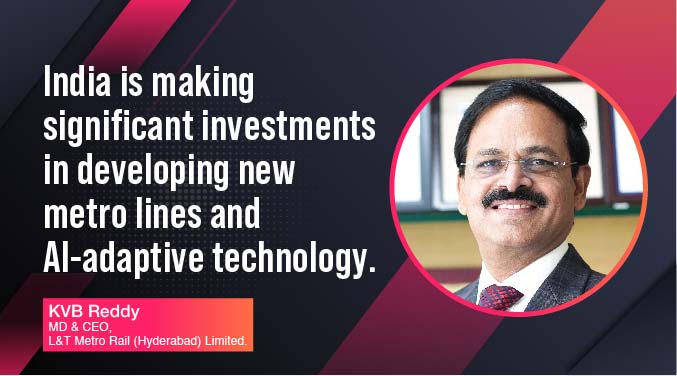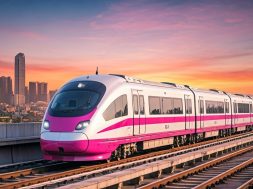India aims to become a major exporter of railway technology on the global stage

India has immense potential to emerge as a significant global exporter of railway technology, but our current efforts are not enough to achieve this goal. To succeed, India needs to focus on developing indigenous technologies and goods, improving the quality of its railway infrastructure, and enhancing the efficiency and safety of its railway network. By doing so, India can establish itself as a leading supplier of railway technology in the global market and boost its economy, says KVB Reddy, MD & CEO of L&T Metro Rail (Hyderabad) Limited.
How are metros and railways transforming as a means of mass transportation?
Over the past few years, India has been making significant progress in enhancing the safety standards of its mass transportation systems, particularly metros and railways. The country has heavily invested in developing and modernising its metro and railway networks, including constructing new metro lines and expanding existing ones in major cities such as Delhi, Mumbai, Bengaluru, and Chennai. Safety standards have been greatly enhanced with the introduction of advanced technologies such as automated signalling systems, CCTV cameras, and communication-based train control systems. Moreover, railway safety has been a top priority, with measures such as eliminating unmanned level crossings, deploying Train Collision Avoidance System, and installing high-tech signalling and communication systems. Overall, India is making remarkable progress towards ensuring the safety of mass transportation, and these efforts are contributing significantly to the country’s economic growth.
Is India’s current effort enough to establish itself as a major exporter of railway technology on the global stage, and if not, what further steps are required?
India has immense potential to emerge as a significant global exporter of railway technology, but our current efforts are not enough to achieve this goal. To succeed, India needs to focus on developing indigenous technologies and goods, improving the quality of its railway infrastructure, and enhancing the efficiency and safety of its railway network. To advance its technological capabilities, the Indian railway sector must allocate more resources to research and development.
Additionally, the government should provide incentives and support to Indian businesses to encourage them to participate in international bids and form partnerships with foreign companies. By doing so, India can establish itself as a leading supplier of railway technology in the global market and boost its economy.

What measures are Indian government agencies and private companies contemplating to promote the development of the metro and rail businesses?
The Indian government and private companies are taking several initiatives to accelerate development in the metro and rail sector. The government has launched programmes such as Made in India, Smart Cities Mission, and Swachh Bharat Abhiyan to improve the country’s infrastructure and mobility. Private companies such as Larsen & Toubro, Tata Projects, and Alstom India are also investing heavily in significant projects related to the metro and rail sectors.
The government is exploring public-private partnerships to enhance the quality and efficiency of railway services. Additionally, the government is looking into new technologies such as automated signalling systems, bullet trains, and railway electrification to upgrade the country’s railway network. These initiatives demonstrate a concerted effort to improve India’s metro and rail sectors and pave the way for further growth and development.
What investments have been made and are necessary to ensure efficiency while meeting project deadlines?
To ensure the timely completion of projects and improve efficiency in the metro and railway sectors, the Indian government and private companies are investing substantial funds. The government has allocated significant funding for rail and metro infrastructure development, with a specific focus on meeting project deadlines. Private companies are also making substantial investments in the industry, with many forming partnerships and alliances to leverage their knowledge and resources. Additional investments are necessary for project execution, improving the quality of railway services, and adopting cutting-edge technologies. Enhanced project management practices and transparent decision-making can improve efficiency and meet deadlines.
What safety protocols and technologies are being used to ensure worker safety?
In India, various protocols are implemented to ensure worker and project safety. These protocols include using personal protective equipment by workers, regular safety inspections and audits, and enforcement of safety standards and guidelines by government bodies such as the Ministry of Railways. Advanced technologies like computerised signalling and train control systems also elevate safety standards. Employee training programs cover safety standards and emergency response protocols. Additionally, the government has established organisations such as the Railway Safety Commission and the National Academy of Indian Railways to oversee safety-related concerns and promote industry best practices.
For more info visit : https://www.ltmetro.com/
Cookie Consent
We use cookies to personalize your experience. By continuing to visit this website you agree to our Terms & Conditions, Privacy Policy and Cookie Policy.










